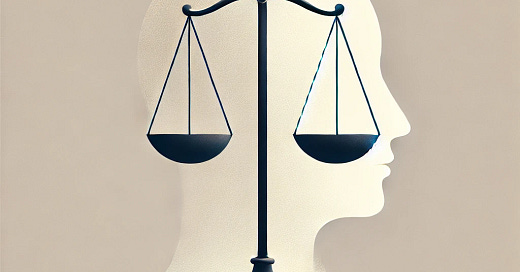Mind Candy is a newsletter on practical philosophy and human flourishment—aka how to live the “the good life.” Each month we tackle a new theme.
This month we’re exploring relationships.
Imagine for a second you are about to be born and you have no idea where in the world you will land. You have no idea where you will be born, who your parents are, whether your family is well-off or impoverished. You have no idea about your genetic makeup and how that will play into your life.
Now you are born into the world.
This thought experiment is similar to that of the philosopher John Rawls’ wherein he asks his reader to take a step back, to remove the glasses of knowledge they are accustomed to, and imagine themselves behind a “veil of ignorance.”
It’s easy for us to grow up and imagine the world is the same for everyone else based upon our own experiences of it. We are always interpreting the world through the lens of our own experience. We will never know another person’s experience, not intimately like our own at least, so it is a skill—a muscle—to learn to see from another person’s experience.
This is counter to how a lot of us think though. We see people struggling to get a job and we don’t think maybe there is something holding them back. Rather, we think they’re not trying hard enough. This is not to say it is always the case, rather, it is that we never know what another is going through.
And this was Rawls’ point with his veil of ignorance—he wanted the reader to set aside all preconceived notions and just take in what another person experienced. Be ignorant to what you know and instead just think what life would look like from the other person’s position.
Take the case of Mike Black who, during COVID, gave up his fortune (he was a millionaire) and said anyone could make $1,000,000 in 12 months. His project, known as Million Dollar Comeback, saw him emptying his bank account, giving up his living, and trying to make a $1,000,000 from scratch.
He found places to sleep for free like someone’s van or a couch, he took free things from Craigslist and tried to flip them on Facebook marketplace. He even started his own coffee company.
But he ended the experiment at ten months having made $935,000 less than he said he would. He formed a tumor on his hip and was diagnosed with two autoimmune diseases. Admittedly, it was much harder than he’d imagined.
“A lot of what's come to light for me is what truly matters, health and gratitude,” he would say.
And this what we’ve talked about before, how there is no such thing as the self-made man, how so much of life is dependent upon timing, circumstances, and flukes. Just because you’ve found success, have health, or hold a comfortable living doesn’t necessarily mean you could do it all again if you had to. Too many things factor into having a decent life.
This was the point of Rawls’ investigation into justice. He believed we needed to help one another, to try and give an equal footing to those who couldn’t get it because of circumstance.
This is why Rawls believed everyone deserved the same opportunities to achieve their goals. He wanted to make sure if you were born into an impoverished life, it didn’t mean your entire future was dictated by that.
“Each person is to have an equal right to the most extensive scheme of equal basic liberties compatible with a similar scheme of liberties for others,” he wrote.
We never know how hard another’s life is until we have to walk it ourselves. But by that ensuring our institutions are setup to help people in different positions, Rawls believed we could form a more just society for all.
Until next time,
D.A. DiGerolamo
We are a participant in the Amazon Services LLC Associates Program, an affiliate advertising program designed to provide a means for sites to earn advertising fees by advertising and linking to Amazon.com.








